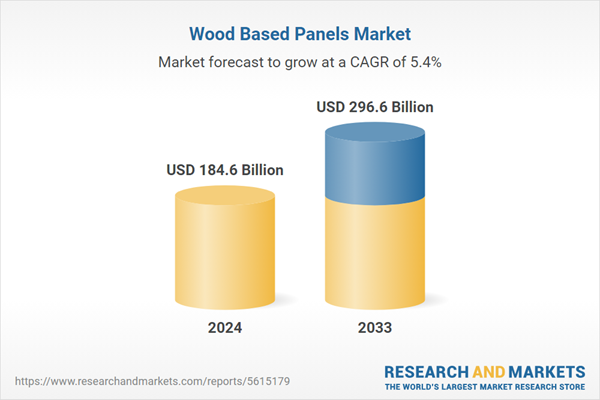Wood Based Panels Market Analysis:
Major Market Drivers: The market is experiencing moderate growth because of the increasing utilization of several forms of sustainable and recyclable components in the construction industry. Also, the increasing need for light weight and useful furniture is driving the need for wood based panels.Key Market Trends: Major market trends consist of heightened need for eco-friendly products among the masses owing to the rise in the environmental consciousness and growing preferences for aesthetically pleasing furniture.
Geographical Trends: Asia Pacific represents the largest market because of the heightened environmental consciousness among individuals and businesses, increasing usage of wood panels in the construction sector, and presence of numerous flagship stores of well known furniture producers.
Competitive Landscape: Some of the major market players in the wood based panels industry include Binderholz GmbH, Dongwha Enterprise, EGGER Group, Evergreen Fibreboard Berhad, Georgia-Pacific LLC (Koch Industries Inc.), Green River Holding Co. Ltd., Kastamonu Entegre, Louisiana-Pacific Corporation, Sonae Arauco, Starbank Panel Products Ltd., West Fraser Timber Co. Ltd., Weyerhaeuser Company, among many others.
Challenges and Opportunities: Difficulties include problems with deforestation and troubles getting the right manufacturer certifications. However, it is anticipated that these issues will be resolved by the growing use of cutting-edge technologies in wood recycling.
Wood Based Panels Market Trends:
Rising Demand for Sustainable and Eco-friendly Products
The market for wood-based panels is driven by user demand for environment friendly and sustainable products. Materials with less of an influence on the environment are more preferred as companies and people are becoming more environmentally concerned. Wood-based panels are gaining traction because they provide a renewable substitute for synthetic materials. This is especially true of wood derived from reclaimed and responsibly managed forests. For example, in 2023, Biffa presented circular recycling ideas for John Lewis in collaboration with Timberpak Ltd, a wood recycling company.The trend is additionally propelled by strict guidelines and certificates guaranteeing the sustainability of wood-based products. In order to increase the sustainability profile of their wood panels and appeal to eco-aware consumers and companies looking to boost their green credentials, companies are investing in innovative manufacturing procedures.
Technological Advancements in Production Processes
Continuous improvements in manufacturing techniques are driving the market expansion for wood-based panels. Technological advancements in manufacturing are producing goods with higher quality, greater efficiency, and lower waste. Advancements in adhesive technology, automated manufacturing lines, and continuous press technology have made it possible for producers to create panels that exhibit exceptional strength, durability, and visual appeal. Furthermore, in order to improve quality control and streamline operations, digital technologies like artificial intelligence (AI) and the internet of things (IoT) are being incorporated into production systems. For instance, Metalube developed a novel lubrication technology in 2024 that not only helped the wood panel sector address air quality issues, but also improve the efficiency of wood panels.Growth in the Construction and Furniture Sectors
Wood panels are widely used in the furniture and building industries to create a wide range of structures. Because of their strength, durability, and affordability, wood-based panels find widespread use in the building sector for structural, interior design, and insulation purposes. The demand for these materials is being driven by an increase in residential and commercial construction projects, especially in emerging nations. Concurrently, there is a notable rise in the furniture sector as a result of growing disposable incomes, evolving lifestyle choices, and heightened urbanization. In 2023, Wooden Bazar revealed the debut of its newest collection of finely carved wooden furniture.Wood Based Panels Market Segmentation:
This report provides an analysis of the key trends in each segment of the global wood based panels market report, along with forecasts at the global, regional and country levels from 2025-2033. The report categorizes the market based on product type, distribution channel and application.Breakup by Product Type:
- Medium Density Fiberboard (MDF)/High Density Fiberboard (HDF)
- Oriented Strand Board (OSB)
- Particleboard
- Softboard and Hardboard
- Plywood
- Others
Plywood accounts for the majority of the market share
The report has provided a detailed breakup and analysis of the market based on the product type. This includes medium density fiberboard (MDF)/high density fiberboard (HDF), oriented strand board (OSB), particleboard, softboard and hardboard, plywood, and others. According to the report, plywood represented the largest segment.Because of its extraordinary adaptability and abundance of uses, plywood is becoming more and more popular in the manufacturing of wood panels. Plywood is a strong, flexible material with many uses that is made by fusing together thin layers of wood veneer. It is an excellent material for both structural and non-structural building applications, including wall sheathing, flooring, roofing, and furniture manufacturing. This is due to its adaptability. It may be creatively used in a range of projects by designers and builders since it can be polished, molded, and sliced in many ways. The analyst predicts that the global plywood market is expected to reach US$ 73.3 Billion by 2032.
Breakup by Distribution Channel:
- Direct Sales
- Online Stores
- Specialty Stores
- Others
Direct sales represent a significant segment in the distribution of wood-based panels, catering primarily to large-scale purchasers such as construction companies, furniture manufacturers, and industrial clients. Direct communication between buyers and producers through this channel enables specialized orders, large purchases, and solutions that are specifically designed to fulfill project specifications.
Online retailers are becoming a more significant means of distribution for wood-based panels due to the growth of e-commerce. Online marketplaces provide a quick and easy option for customers and small companies to peruse, evaluate, and buy wood panels from numerous vendors.
Specialty stores play a crucial role in the distribution of wood-based panels, particularly for customers seeking expert advice and high-quality, niche products. These stores cater to professional builders, architects, interior designers, and do-it-yourself (DIY) enthusiasts who require specific types of wood panels for unique applications, thereby propelling the wood based panels market growth.
Breakup by Application:
- Furniture
- Construction
- Packaging
- Others
Furniture represents the leading market segment
The report has provided a detailed breakup and analysis of the market based on the application. This includes furniture, construction, packaging, and others. According to the report, furniture represented the largest segment.Because of the growing demand for cost-effective, versatile, and visually pleasing furniture options, the use of wood-based panels is rising. Additionally, furniture pieces like shelves, tables, chairs, and cabinets are commonly constructed using wood panels like medium density fiber board (MDF), plywood, and particleboard. These materials offer a feasible alternative to solid wood with improved strength, stability, and design flexibility at a lower price. Manufacturers can offer a wide range of styles and finishes to meet diverse customer preferences due to the simplicity of applying laminate or veneer wood panels. The increased demand for environment friendly and sustainable furniture has led to a rise in popularity of wood-based panels, as they can be produced using recycled and renewable materials. Furthermore, according to data shared, the worldwide furniture market is projected to hit US$ 701.7 Billion by 2032.
Breakup by Region:
- North America
- United States
- Canada
- Asia-Pacific
- China
- Japan
- India
- South Korea
- Australia
- Indonesia
- Others
- Europe
- Germany
- France
- United Kingdom
- Italy
- Spain
- Russia
- Others
- Latin America
- Brazil
- Mexico
- Others
- Middle East and Africa
Asia Pacific leads the market, accounting for the largest wood based panels market share
The report has also provided a comprehensive analysis of all the major regional markets, which include North America (the United States and Canada); Asia Pacific (China, Japan, India, South Korea, Australia, Indonesia, and others); Europe (Germany, France, the United Kingdom, Italy, Spain, Russia, and others); Latin America (Brazil, Mexico, and others); and the Middle East and Africa. According to the report, Asia Pacific represents the largest regional market for wood based panels.The Asia Pacific wood-based panels market is driven by a combination of factors including rapid urbanization, industrialization, and an expanding middle class. Additionally, the escalating demand for affordable and stylish furniture in the region is increasing the use of plywood, MDF, and particleboard. Technological advancements in manufacturing processes are enhancing the quality and performance of these panels, making them more competitive with traditional solid wood products. Environmental concerns and regulatory measures are growing emphasis on sustainable sourcing and eco-friendly products. Moreover, the region's significant manufacturing base and availability of raw materials contribute to the competitiveness of local producers in both domestic and export markets. Manufacturers are also expanding their operations and opening new stores to reach more number of customers. For instance, Remax Furniture in 2024, announced the grand opening of its flagship store in New Delhi, India.
Competitive Landscape:
The market research report has also provided a comprehensive analysis of the competitive landscape in the market. Detailed profiles of all major companies have also been provided. Some of the major market players in the wood based panels industry include Binderholz GmbH, Dongwha Enterprise, EGGER Group, Evergreen Fibreboard Berhad, Georgia-Pacific LLC (Koch Industries Inc.), Green River Holding Co. Ltd., Kastamonu Entegre, Louisiana-Pacific Corporation, Sonae Arauco, Starbank Panel Products Ltd., West Fraser Timber Co. Ltd. Weyerhaeuser Company, etc.(Please note that this is only a partial list of the key players, and the complete list is provided in the report.)
Leading companies are heavily investing in advanced manufacturing technologies to improve the quality, efficiency, and sustainability of their wood-based panels. Innovations such as continuous press technology, advanced adhesives, and automation are helping manufacturers produce higher-quality panels with better durability and aesthetic appeal. To cater to diverse market demands, key players are expanding their product portfolios. This includes developing new types of panels with enhanced features, such as fire resistance, water resistance, and improved acoustic properties. Companies are adopting eco-friendly practices by sourcing wood from sustainably managed forests and increasing the use of recycled materials in their products. For instance, Binderholz Group in 2024, announced that they will be supplying CLT BBS, glulam, and 3 layered solid wood panels to Tllburg University for constructing a 5-storey lecture hall center. The timber construction components were installed in such a manner that they can be easily dismantled for further usage.
Key Questions Answered in This Report
1. What was the size of the global wood based panels market in 2024?2. What is the expected growth rate of the global wood based panels market during 2025-2033?
3. What are the key factors driving the global wood based panels market?
4. What has been the impact of COVID-19 on the global wood based panels market?
5. What is the breakup of the global wood based panels market based on the product type?
6. What is the breakup of the global wood based panels market based on the application?
7. What are the key regions in the global wood based panels market?
8. Who are the key players/companies in the global wood based panels market?
Table of Contents
Companies Mentioned
- Binderholz GmbH
- Dongwha Enterprise
- EGGER Group
- Evergreen Fibreboard Berhad
- Georgia-Pacific LLC (Koch Industries Inc.)
- Green River Holding Co. Ltd.
- Kastamonu Entegre
- Louisiana-Pacific Corporation
- Sonae Arauco
- Starbank Panel Products Ltd.
- West Fraser Timber Co. Ltd.
- Weyerhaeuser Company
Table Information
| Report Attribute | Details |
|---|---|
| No. of Pages | 139 |
| Published | May 2025 |
| Forecast Period | 2024 - 2033 |
| Estimated Market Value ( USD | $ 184.6 Billion |
| Forecasted Market Value ( USD | $ 296.6 Billion |
| Compound Annual Growth Rate | 5.4% |
| Regions Covered | Global |
| No. of Companies Mentioned | 12 |









